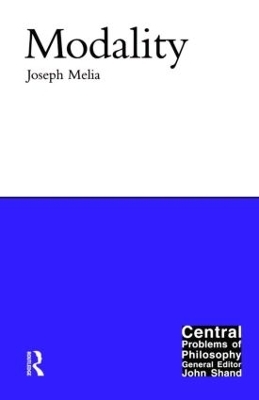
Modality
Seiten
2003
Acumen Publishing Ltd (Verlag)
978-1-902683-48-5 (ISBN)
Acumen Publishing Ltd (Verlag)
978-1-902683-48-5 (ISBN)
- Titel nicht im Sortiment
- Artikel merken
This introduction to modality places the emphasis on the metaphysics of modality rather than on the formal semetics of quantified modal logic. In particular, the discussion is centered on the nature of possible worlds.
This introduction to modality places the emphasis on the metaphysics of modality rather than on the formal semetics of quantified modal logic. The text begins by introducing students to the "de re/de dicto" distinction, conventionalist and conceptualist theories of modality and some of the key problems in modality, particularly Quine's criticisms. It then moves on to explain how possible worlds provide a solution to many of the problems in modality and how possible worlds themselves have been used to analyse notions outside modality such as properties and propositions. Possible worlds introduce problems of their own and the book argues that to make progress with these problems a theory of possible worlds is required. The pros and cons of various theories of possible worlds are then examined in turn, including those of Lewis, Kripke, Adams, Stalnaker and Plantinga.
This introduction to modality places the emphasis on the metaphysics of modality rather than on the formal semetics of quantified modal logic. The text begins by introducing students to the "de re/de dicto" distinction, conventionalist and conceptualist theories of modality and some of the key problems in modality, particularly Quine's criticisms. It then moves on to explain how possible worlds provide a solution to many of the problems in modality and how possible worlds themselves have been used to analyse notions outside modality such as properties and propositions. Possible worlds introduce problems of their own and the book argues that to make progress with these problems a theory of possible worlds is required. The pros and cons of various theories of possible worlds are then examined in turn, including those of Lewis, Kripke, Adams, Stalnaker and Plantinga.
Joseph Melia is Lecturer in Philosophy at the University of Leeds.
Acknowledgements 1. Introduction to modality 2. Modal language and modal logic 3. Quinian scepticism 4. Modalism 5. Extreme realism 6. Quiet moderate realism 7. Possible worlds as sets of sentences Notes Further reading Index
| Erscheint lt. Verlag | 6.11.2003 |
|---|---|
| Reihe/Serie | Central Problems of Philosophy |
| Verlagsort | Durham |
| Sprache | englisch |
| Maße | 129 x 198 mm |
| Gewicht | 453 g |
| Themenwelt | Geisteswissenschaften ► Philosophie ► Erkenntnistheorie / Wissenschaftstheorie |
| Geisteswissenschaften ► Philosophie ► Logik | |
| ISBN-10 | 1-902683-48-X / 190268348X |
| ISBN-13 | 978-1-902683-48-5 / 9781902683485 |
| Zustand | Neuware |
| Informationen gemäß Produktsicherheitsverordnung (GPSR) | |
| Haben Sie eine Frage zum Produkt? |
Mehr entdecken
aus dem Bereich
aus dem Bereich
die Grundlegung der modernen Philosophie
Buch | Softcover (2023)
C.H.Beck (Verlag)
18,00 €
Buch | Softcover (2023)
Reclam, Philipp (Verlag)
7,00 €

![Was heißt Denken?. Vorlesung Wintersemester 1951/52. [Was bedeutet das alles?] - Martin Heidegger](/media/113619842)
